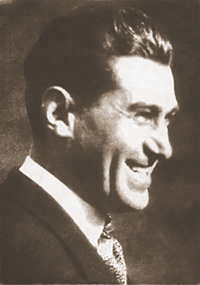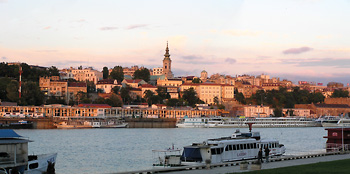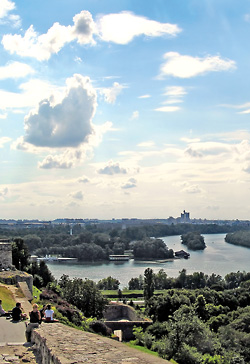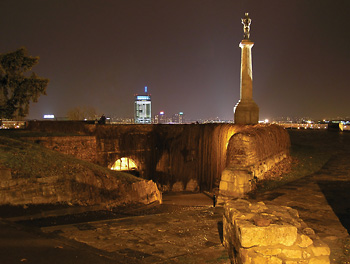Guide
MILOŠ CRNJANSKI (1893-1977) AND A matchlessly DEEP BOW TO MR. BELGRADE
Eternal Passion of the Glorious Town
The famous writer wrote his guide ”Belgrade” in 1936, in French. Even today, that little book is a supreme tutor of writing about, dreaming, loving, building, defending and understanding one’s city. During the several millennia of Belgrade history, no one has ever written better or deeper about it than Crnjanski, dandy and warrior, short-tempered and gentle, fire and breeze, with the scent of gunpowder and acacia. When will Belgrade repay him?
By: Dragana Bukumirović
Photo by Aleksandar Ćosić
 ”Whose names are written in St. Petersburg and Moscow? If I enter the snowy evenings of Vienna, if I start walking through the fog of London, Paris, if I read the history of Bucharest, if I go down to Constantinople, threads and strings, like cobweb, all lead me to the heart of Belgrade. There is not a city in Europe so much related to all the others and which moved the marionettes of others like Belgrade.” ”Whose names are written in St. Petersburg and Moscow? If I enter the snowy evenings of Vienna, if I start walking through the fog of London, Paris, if I read the history of Bucharest, if I go down to Constantinople, threads and strings, like cobweb, all lead me to the heart of Belgrade. There is not a city in Europe so much related to all the others and which moved the marionettes of others like Belgrade.”
Thus wrote Miloš Crnjanski in his little known tourist guide Belgrade.
A thin book, with about a hundred pages, including photos, is a deep bow of the writer to the city he carried in his heart as his homeland. We have been waiting for more than half a century for diligent Gojko Tešić to hunt it out and publish it in Narodna knjiga in the Slučaj (The Case) edition, translated by Mira Vuković from French. And this tourist-literary piquantery from the pen of our great writer was published in France already in 1936! For a long, too long time it has been sitting in the darkness, inaccessible to the wider audience.
The great writer conquered the new form of writing tourist guides and travel accounts with ease, where talent is implied, but also seeks a practical mind and masterly reduced style. Is it really the characteristic of the writer of Migrations and The Journal of Čarnojević? Still, living the role of a tourist guide, with adjusted optics, he stepped into a new form, inhabited the deserted continent and created an original work. His guide is a small and touching book, and a practical road sign – where, how and with which the traveler shall painlessly conquer a new destination – a calm literature on the surface, while inside soaked with melancholy and deep feeling towards the city he loved so much and longed for.
The master of the pen knows that the world can only be described, not explained, that only what is not seen exists. He alone lived like a nomad, went from city to city, from state to state (from his birthplace of Chongrad, then Timisoara, Pančevo, Stražilovo, working in Rome and Berlin, long and difficult years in London), carrying Serbia and Belgrade in his heart.
Only outlines in the night sky, always different nights yet same sky, and different lines of the city edges remained to him from each city in which his life passed. However, that Belgrade, that constant in it, moved his hand to write the guide and invite: ”Come, come and see it.”
”I have lived everywhere, I have rambled everywhere, and when I begin wailing, far away, Belgrade comes and consoles me”, he used to say, and admitted to his wife, Mrs. Vida: ”I have taken you only because I found you in Belgrade…”
GENTILITY FROM UNDESERVED INSULTS
Crnjanski longed to bring European and any other travelers close to his beloved city. When the pen starts flying, freed of statistics and other necessary data, from history to climate and geographic position, he enthusiastically invites to Belgrade, although he knows that his much-loved Belgrade does not have the perfect beauty of the cities which developed slowly and safely.
”It is a city of clerks and officers, created from nothing, while others digested the Schwab mercy. Houses one by another, marriages according to the father’s wish and deaths according to God’s wish, and wars. From these streets I see the blue railway of Srem… Belgrade has the gentility created from undeserved insults. It is full of emotions of a great European tact. Never has it insulted anyone experiencing a bitter moment, nor has it ever humbled itself in its own bitter moment…”
 The city on the banks of two powerful rivers, one of the most beautiful cities in Europe, used to be praised by pilgrims who passed it on their way to Jerusalem, the emissaries and ambassadors of European palaces who stopped on their way to Istanbul to bow to the sultan, while in our times, financial magnates and great movie stars passing through admire it, notes the writer. Alexander Humbolt compared it to Lisbon, Istanbul and Stockholm, while the position of the old Belgrade fortress reminded our Pupin of the position of Gibraltar. The city on the banks of two powerful rivers, one of the most beautiful cities in Europe, used to be praised by pilgrims who passed it on their way to Jerusalem, the emissaries and ambassadors of European palaces who stopped on their way to Istanbul to bow to the sultan, while in our times, financial magnates and great movie stars passing through admire it, notes the writer. Alexander Humbolt compared it to Lisbon, Istanbul and Stockholm, while the position of the old Belgrade fortress reminded our Pupin of the position of Gibraltar.
Crnjanski, realizing his assignment as a tourist writer, merges the époques gone under the Belgrade sky, fits them into several pages of his little book and repeats: ”A guide is not literature like a travel account.” This master knew the difference. He knew what to do with words, but sometimes barely manages to withhold and write his thoughts, especially when some other facts in life are more important – price of accommodation, ticket, excursions, hotels, entertainment…
He is experienced; he had already written the guide Rome and Its Surroundings, but, as he openly said, the reader of Love in Toscana will not have a good time if he decides to travel there.
He meticulously introduces a traveler ready to conquer Belgrade to the turbulent history and battlefields from which this city repeatedly rose. Can he not remind of the great misfortune which struck this city in the V century, during the invasion of the Huns from Asia, when both the Danube fortress and the whole city were destroyed? What at all can be omitted from the turbulent history of this amazing city?
All this is reduced to a few pages by the master’s hand, without neglecting monarchs and generals, old edifices, museums, theaters, authors and their works, even good restaurants and hotels. He suggests those who are in a hurry to come by airplane, although he considers the journey down the Danube as the most pleasant route between Western Europe and the East.
THE DESPOT AND THE DANUBE BEAUTY
 In Crnjanski’s time, Belgrade had several large ”Vienna type” cafés, such as ”Ruski Car”, ”Akademija Nauka” and ”Moskva”. Among other things, guests had all local and foreign newspapers at their disposal. (And today?) In Crnjanski’s time, Belgrade had several large ”Vienna type” cafés, such as ”Ruski Car”, ”Akademija Nauka” and ”Moskva”. Among other things, guests had all local and foreign newspapers at their disposal. (And today?)
Crnjanski also writes about the character of Belgrade people, the strange mixture of cheerfulness and irony. He calls them spendthrifts. He knows how much troubles those people suffered and that they defend themselves and make their life bearable with humor, that not much can surprise them; he forgives them wine and good mood. ”Nowhere in the world does anyone speak so badly about us as we do here, at home, and allow others to speak that way too. So many of them have poured their anger, wisdom and bile over Belgrade!” says Crnjanski angrily.
The oldest beauty of this city is neither known nor anticipated, nor sought. Its beauty is the Despot and the Danube beauty. The stone tower is reflected in the water. Where did the rich, silk Turkish galleys go, with yellow skewed swords like crescent moons, bent over the naked bodies of female slaves? asked himself Crnjanski, the same writer and dreamer who contemplated that life is not visible, but beyond our powers, ”in heavens”, and continued:
”Where is the Despot who loved Belgrade so much, with the beauty of the watchtower, on top of the hill? Where is the old Istanbul colorfulness, which had to spread somewhere over these waters? Did they leave us our famous gentle spring, thrown into steep old streets, with fruit trees behind fences?
That late Turkish era is still here, during the first February sunbathing, under the walls with the bonfire of enormous sunsets. Some shop windows, smelling like halvah and coffee, are still quiet. The white spear of the minaret defends them, and they pass like everything passes. Should that Belgrade which shook the Balkans disappear? Which town of ours had such zeal in the past? Wasn’t it extinguished by those English, French and Russian consuls? Belgrade has been ticking for the Balkans, for already a hundred years. It is the heart of everyone breathing on the Adriatic and Aegean Sea.”
THE WHITE SWAN SUNBATHES
He was not enchanted by Belgrade because he has not seen the world. In numerous travel accounts and reports we see him illuminating the beaches of the Adriatic Sea, Boka Kotorska and many European cities with his gift. While passing through Vienna, he wrote:
”It is snowing outside, and ladies with semi-naked breasts, wrapped in fur, are still passing by. Tall and pale Dalmatians, often supported by plump ladies, are gone. The Banatians with silk socks are also not here. Only merchants remained, all with pink cheeks. They are now having lunch in ‘Bristol’ and after eating they will hiccup…”
 Crnjanski was in Munich one foggy morning. Immersed in his thoughts about his ”mad life” accompanied by the clacking of railway wheels, he notes: ”We entered the station and everything became: Munich. Nothing has changed. I spoke with the officers, calmly, as well as with tram brakesmen, had dinner with the socialists, and before midnight had conversations with those who got drunk from heavy bear greasy like slops. The officers told me that our heroism is pure savagery, that Serbian women are cheaper than Hungarian or Polish. Just like that. Oh, don’t worry, I smiled, and mentioned Senegal men and German women…” Crnjanski was in Munich one foggy morning. Immersed in his thoughts about his ”mad life” accompanied by the clacking of railway wheels, he notes: ”We entered the station and everything became: Munich. Nothing has changed. I spoke with the officers, calmly, as well as with tram brakesmen, had dinner with the socialists, and before midnight had conversations with those who got drunk from heavy bear greasy like slops. The officers told me that our heroism is pure savagery, that Serbian women are cheaper than Hungarian or Polish. Just like that. Oh, don’t worry, I smiled, and mentioned Senegal men and German women…”
He was amazed by Italy, ”light and transparent, with gravel in his hand”, he illuminated Toscana with his gift. ”Where all nations except Slavic went, I went too, confused, to find my morning star”, he wrote in his travel account Love in Toscana.
”Only there, in Sienna, I thought with my gentility and sadness, I can create a new homeland, one I had not had for a long time. I am not bound by old forms and considerations, the blue Serbian forests are barely seen. I will offer myself to spring, I will lean my back against the cherry and sour cherry trees of Srem, and invisibly, neither praised nor mocked, I will connect with my exhausted body, the mud and the grasses, the hills and the clouds…”
He breathed the scent of Paris and the Sena, he admired evenings full of wide waters and bridges bending over eternity and spring, after rains which bring peace. He admired the Paris old ladies selling combs, oranges, newspaper and singing all evening. He admired the people, bent under sins and debauchery, carefree, all for the sake of life.
During his travels, he made at least half of Europe eternal with his pen, but nothing can be compared with his writings about old Belgrade, its fruit trees, old lyceums and windows at dusk. That lyricist magician knew: ”The pre-war Belgrade which withdrew to Krunska Street and Vračar will also disappear. The Belgrade of warm evenings and acacias, houses in gardens, young people caring about Old Serbia. The Belgrade which had done things no one in Europe was even allowed to dream about, hot and merry, wonderful in its youth…”
”The upcoming Belgrade is even more beautiful. It stands there and builds itself as if the whole earth is empty. It stands and sunbathes above the Sava, ‘the white swan’, as Branko Radičević used to call it.
The life of Belgrade has been a novel since a long time ago, even when many of our cities were just small towns. Belgrade is a zeal which began burning a long time ago…”
***
The Case
Miloš Crnjanski (1893-1977) – superb novel writer, drama writer, narrator, poet, travel account writer, journalist, teacher, diplomat, football player, gentle creator and heartbreaker, so to say The Case (which is also the title of the edition within which his tourist guide was published in Serbian, although late and with a small number of copies). How else would Mr. Crnjanski pass by in present Serbia than marked as ”the case”?
In Belgrade, which he defended and built so many times in his dreams and reality, he does not have a worthy street today. His endowment rots in the cellar of a disputed building, and the award carrying his name was extinguished due to lack of money and insignificance. However, his guide Belgradecan even today serve as a supreme tutor to many of those who, although untaught, were placed to be teachers to others.
***
Trains and Nobility
Traveling by train also has its beauties, says Crnjanski. The building of the Belgrade railway station, built at the time of Prince Mihailo, is surrounded with good restaurants and a garden, newspaper stands, tobacco shops… Guides from the ”Putnik” agency, with knowledge of foreign languages, wait for foreign tourists in this noble city diving out before our eyes. They can entrust their luggage without fear to the carriers who have a number on their cap, and a row of taxis waits at the exit. The starting price is 8 Dinars and one Dinar per each one hundred meters. Buses belonging to big hotels wait for the arrival of fast trains, while there are also horse carts and trams in front of the station.
|
